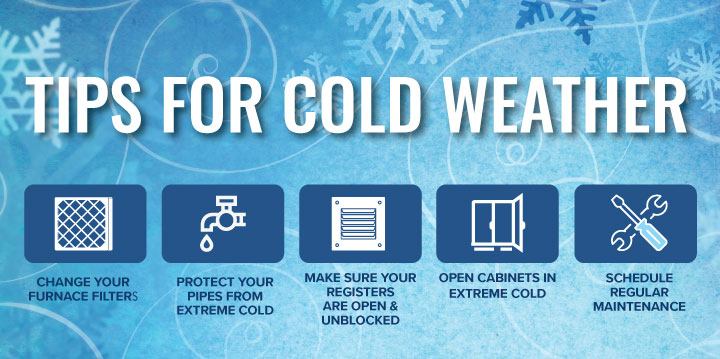
If your furnace struggles to keep up with the cold but maintains your home's temperature within a few degrees, it's likely working as it should. However, you might need to supplement with an alternative heat source for added comfort during extreme weather. Check out our tips for protecting your home in cold weather and if you have any concerns about heating, plumbing, or frozen drains, don't hesitate to call us at 833-789-9100.
For your heating system:
- Schedule regular maintenance.
- Change your furnace filters.
- Make sure your registers and vents are open and unblocked. Dangerous carbon monoxide can build up if outdoor vents from your clothes dryer is blocked. If you suspect carbon monoxide in your home, vacate immediately and call 911.
- Seal drafts around doors & windows.
For your plumbing:
- Protect pipes in your attic, basement, and crawlspace from extreme cold with insulation. Pipes are most likely to freeze when temperatures drop below 20°F.
- Open cabinets that house plumbing pipes to help warm air circulate.
- Slowly drip faucets to relieve pressure in the pipes—this is especially important for any pipes that run along exterior walls.
- Drain outdoor water lines and turn off the water supply to outdoor hose bibs.
- Set your thermostat to a temperature that will prevent pipes from freezing.
- Treat drains in exposed areas, such as crawlspaces, with insulation just as you would with water lines.
Our Peace of Mind Club customers can take advantage of a once-per-year plumbing inspection, available upon request.
Extra ways to stay safe:
- If you have a camper trailer, pre-fill extra propane tanks and ensure any batteries are fully charged in case your home's heating or electrical system goes out.
- Make sure your car or other vehicle batteries are charged, and fill up your gas tank before the extreme weather hits.
- Identify somewhere you can go in case of an emergency, such as a hotel or a family member's home.
- Let your neighbors know you are available to help in case they have an emergency.
- Check in with elderly neighbors and family during extreme weather conditions.
- Never leave animals outside for extended periods during extreme weather conditions. Dogs and cats can get frostbite, just like you!
